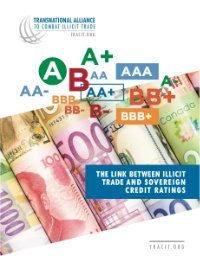Illicit Trade and Sovereign Credit Ratings
By Transnational Alliance to Combat Illicit Trade (TRACIT),
In light of the strong and widespread impacts of illicit trade on countries’ economic output and performance, a new report from the Transnational Alliance to Combat Illicit Trade (TRACIT) investigates whether a correlation can be established between individual countries’ creditworthiness and their vulnerability to illicit trade. The report compares the credit ratings attributed by S&P Global, Fitch Group and Moody's and the scores attributed by the Global Illicit Trade Environment Index, and finds that countries that are poorly equipped to tackle illicit trade also suffer from poor credit worthiness. Illicit trade has a direct negative impact on the very economic, social, and institutional risk factors that credit rating agencies evaluate to determine countries’ ability to honor their debt. The corruption, crime, human trafficking, money laundering, and environmental degradation connected with illicit trade all combine to weaken a country’s economic, financial and institutional stability that underpin its credit ratings. Correcting the regulatory environment and economic circumstances that enable illicit trade can improve the environment upon which a country’s credit ratings are based. Governments should prioritize and increase efforts to combat illicit trade, and the underlying conditions that facilitate it, because of the severe repercussions it has on society, the economy, and development, and because it is in their own financial interest to do so.
NY: TRACIT 2021. 18p.


